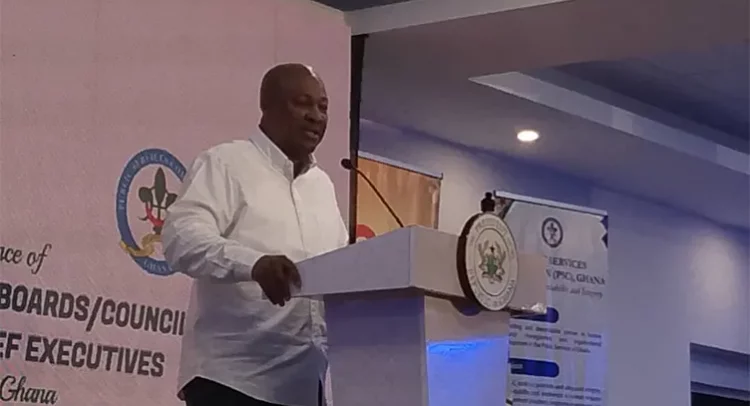President John Dramani Mahama
President John Dramani Mahama has unveiled a far-reaching reform agenda aimed at transforming Ghana’s public service into a transparent, accountable, and performance-driven institution.
Speaking at the 12th Annual Conference of Chairpersons of Governing Boards and Councils, Chief Directors, and Chief Executives of the Public Services of Ghana in Accra, President Mahama described the reforms as a bold and necessary step toward building an efficient and citizen-centered public sector.
He noted that the transformation of the public service is central to his government’s broader vision of ensuring effective service delivery and restoring public confidence in state institutions.
“We are determined to build a public service that truly serves the people, one that is professional, efficient, and responsive to the needs of citizens, this is not merely an administrative reform; it is a transformation of mindset and culture.”
He expressed deep concern over recurring inefficiencies and irregularities within the public payroll system, especially the persistent challenge of “ghost names” that continue to drain the national purse.
To address this long-standing issue, he directed that all public service institutions whether subvented or not be fully integrated into the Human Resource Management Information System (HRMIS).
The President said the HRMIS will serve as the single authoritative source of personnel data across the public sector, creating a unified and transparent platform for effective human resource management.
“With the HRMIS as the central database, we will eliminate data inconsistencies and ensure that every public servant on the payroll is duly verified,” he stated. “This is a crucial step in cleaning up the system and improving fiscal discipline.”
The move, he emphasised, will strengthen accountability and promote better planning, coordination, and monitoring of the public workforce.
President Mahama also lamented on the prevailing culture in which hardworking and non-performing public servants are rewarded equally, describing it as “a deterrent to innovation and excellence.”
He noted that “all over the world, reward is tied to performance but here, the lazy one gets the same as the hardworking one, which kills motivation and productivity.”
To change this, the President announced the introduction of a Pay-for-Performance and Productivity Framework, developed collaboratively by the Ministry of Finance, the Fair Wages and Salaries Commission, and the Public Service Commission.
The framework, scheduled to be piloted in January 2026, will link public sector rewards directly to measurable performance outcomes.
The policy aims to institutionalise a results-oriented culture that motivates employees, promotes accountability, and enhances public service delivery.
“This framework will ensure that those who go the extra mile are recognised and rewarded, while those who fail to meet expectations are encouraged to improve,” he disclosed.
President Mahama further stressed that reforming the public sector goes beyond systems and structures but requires ethical leadership and a renewed commitment to public service values.
He called on all heads of institutions to lead by example and champion integrity, professionalism, and innovation within their respective agencies.
Stakeholders at the conference commended the initiative as timely and necessary for addressing long-standing inefficiencies and restoring discipline and integrity in the public service.
They noted that if fully implemented, the reforms could mark a turning point in Ghana’s public administration by streamlining personnel management, curbing waste, and fostering a culture of productivity aligned with the nation’s development goals.


